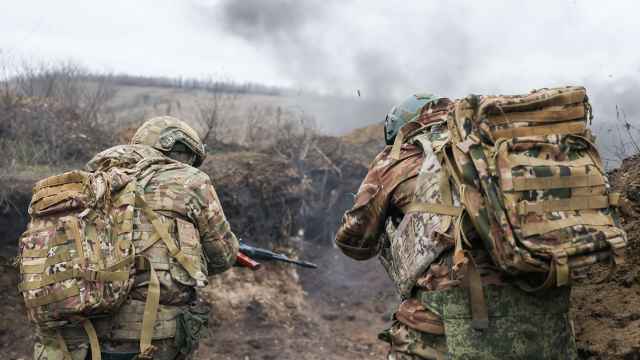On Nov. 14, the Azerbaijani Foreign Ministry summoned Moscow’s ambassador after Baku’s embassy in Kyiv was struck during Russia’s latest drone and missile attacks that day. The other side was informed that the latest explosion completely destroyed part of the embassy’s fence and damaged buildings and vehicles. Fortunately, the explosion did not cause any casualties.
Yet there has been no accountability from Russia, especially considering that this attack came right after Azerbaijan’s president Ilham Aliyev hosted a NATO delegation and noted the expanding relations between Baku and the alliance.
Azerbaijan has also started to shift from working closely with Russia to strengthening economic ties with China. Most notoriously, the missiles struck after political friction and Russia’s public apology for aiming at an Azerbaijan Airlines plane.
That incident raised similar questions. Why the plane was redirected to Aktau by Russia instead of landing in Grozny? Even with the public apology, the answer to this question still remains a mystery.
After the meeting of the Azerbaijani and Russian presidents in October, Azerbaijan was shaken by the news that a coup attempt orchestrated by former presidential aide Ramiz Mehdiyev was allegedly backed by Moscow. As news emerged that Mehdiyev’s allies were being detained, this so-called accident happened.
According to Baku’s Foreign Ministry, Moscow received the coordinates of Azerbaijan’s diplomatic buildings back in April 2022 and the Defense Ministry assured Baku that the coordinates would be taken into account by them.
That raises the question of whether these attacks were really accidents at all.
Even if unintentional, striking politically important buildings of a country with which you have friction is not a neutral act.
To prove it better, we can look at the Kremlin’s track record of retaliating against countries that stand up to it. After Georgia arrested Russian spies in 2006, Moscow responded with mass deportations, and trade embargoes. Or when Moldova moved toward Europe, Russia used its energy dominance over the country. Russia manipulated and shut down gas supplies whenever it wanted to maximise pressure on Chisinau.
When the Czech Republic bought ammunition for Ukraine, arms depots exploded under mysterious circumstances later attributed to Russian operatives. Even Russia’s war on Ukraine started after Kyiv started to turn to the West, so Moscow used claims of “denazification” to legitimize the full-scale invasion.
Russia has a pattern of using deniable pressure against governments that have displeased it. Sometimes the message comes through trade embargoes, gas cuts, deportations, information warfare, mysterious explosions, cyberattacks or unfortunate incidents involving the diaspora of the state in question. Whatever the method Moscow chooses, the timing is rarely coincidental.
These missile attacks are not a recent development. On March 10, 2022, Azerbaijan’s Honorary Consulate in Kharkiv suffered serious damage in an airstrike that also rendered the building’s car unusable. The attack came shortly after Azerbaijan decided against tying its colors to Moscow’s mast and sent humanitarian aid to Ukraine.
Russia also carried out another airstrike with a Kinzhal missile on Jan. 2, 2024, forming a crater near the embassy's administrative building. Thankfully, the damage was limited. At that time Azerbaijan was working to remove Russian peacekeepers from Nagorno-Karabakh, trying to reduce Russia’s role in mediating the conflict.
On Aug. 8 and 18, 2025, as tensions mounted following the Azerbaijan Airlines crash in December 2024, Russia launched drone attacks on the SOCAR oil base in the Odesa region, resulting in injuries to workers and significant damage to infrastructure.
Then on Aug. 28, an airstrike landed approximately 50 meters away from the Azerbaijani Embassy in Kyiv. It damaged the administrative building, consular department, the ambassador's residence and the territory of the diplomatic mission. The attack just came right after Azerbaijan’s tit-for-tat reaction to Russia’s mass arrests and police violence against Azerbaijanis in Yekaterinburg and the mass deportation of Azerbaijani government officials, even the ones who have Russian passports.
A Message from The Moscow Times:
Dear readers,
We are facing unprecedented challenges. Russia's Prosecutor General's Office has designated The Moscow Times as an "undesirable" organization, criminalizing our work and putting our staff at risk of prosecution. This follows our earlier unjust labeling as a "foreign agent."
These actions are direct attempts to silence independent journalism in Russia. The authorities claim our work "discredits the decisions of the Russian leadership." We see things differently: we strive to provide accurate, unbiased reporting on Russia.
We, the journalists of The Moscow Times, refuse to be silenced. But to continue our work, we need your help.
Your support, no matter how small, makes a world of difference. If you can, please support us monthly starting from just $2. It's quick to set up, and every contribution makes a significant impact.
By supporting The Moscow Times, you're defending open, independent journalism in the face of repression. Thank you for standing with us.
Remind me later.






